Session Dates
17 Oct 2002
Abstract
After a brief outline of the Generalized Beam Theory (GBT) fundamentals and linear stability analysis procedure, the main concepts and steps involved in the derivation of GBT -based fully analytical formulae are described and discussed. Such formulae provide distortional bifurcation stress estimates in cold-formed steel channel columns and beams with arbitrary sloping single-lip edge stiffeners and pinned/free-to-warp or fixed/warping-free end sections. The application of the proposed formulae is illustrated in detail and, in order to assess their accuracy and validity, results concerning several specific channel columns and beams are presented. In particular, the GBT-based analytical estimates are compared with exact numerical results and, whenever possible, also with values yielded by the formulae developed by Lau & Hancock, Hancock and Schafer.
Department(s)
Civil, Architectural and Environmental Engineering
Research Center/Lab(s)
Wei-Wen Yu Center for Cold-Formed Steel Structures
Meeting Name
16th International Specialty Conference on Cold-Formed Steel Structures
Publisher
University of Missouri--Rolla
Document Version
Final Version
Rights
© 2002 University of Missouri--Rolla, All rights reserved.
Document Type
Article - Conference proceedings
File Type
text
Language
English
Recommended Citation
Silvestre, Nuno and Camotim, Dinar, "GBT-based Distortional Buckling Formulae for Thin-walled Channel Columns and Beams" (2002). CCFSS Proceedings of International Specialty Conference on Cold-Formed Steel Structures (1971 - 2018). 3.
https://scholarsmine.mst.edu/isccss/16iccfss/16iccfss-session1/3
GBT-based Distortional Buckling Formulae for Thin-walled Channel Columns and Beams
After a brief outline of the Generalized Beam Theory (GBT) fundamentals and linear stability analysis procedure, the main concepts and steps involved in the derivation of GBT -based fully analytical formulae are described and discussed. Such formulae provide distortional bifurcation stress estimates in cold-formed steel channel columns and beams with arbitrary sloping single-lip edge stiffeners and pinned/free-to-warp or fixed/warping-free end sections. The application of the proposed formulae is illustrated in detail and, in order to assess their accuracy and validity, results concerning several specific channel columns and beams are presented. In particular, the GBT-based analytical estimates are compared with exact numerical results and, whenever possible, also with values yielded by the formulae developed by Lau & Hancock, Hancock and Schafer.



